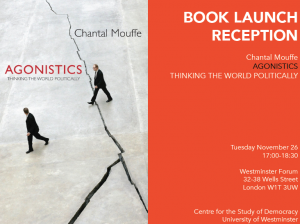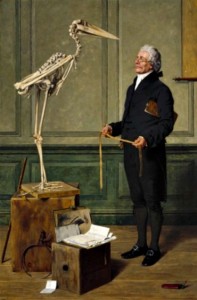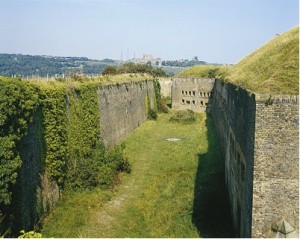Posts by David
Dr Who’s The War Games, January 22 2014
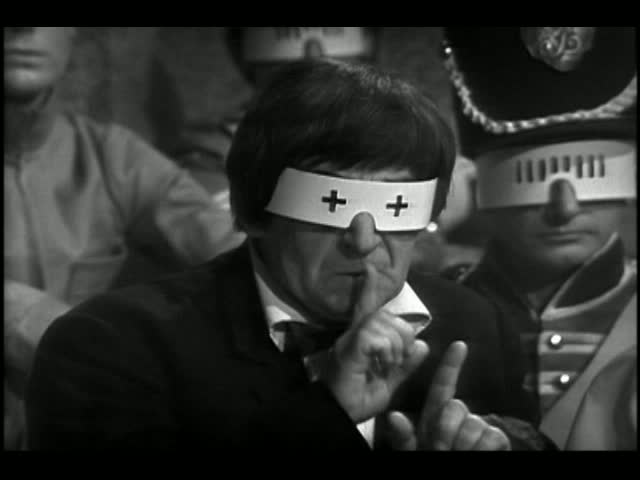
Wednesday 22 January 2014, 2.30-4.30 pm (please note change of time)
Room 2.01, School of Law, Little Titchfield Street
“A turning point for Dr Who: the War Games Revisited”
The seminar will comprise an introduction from Danny Nicol, a screening of the pivotal episode 10 of Dr Who’s The War Games (1969) and will be followed by a discussion.
Final Reminder: The Historical Novel of the Contemporary
The Historical Novel of the Contemporary: A Symposium
Tuesday 3rd December, 2-6pm
Carroll / Fletcher Gallery, 56 – 57 Eastcastle Street, London W1W 8EQ
Speakers: Emmanuel Bouju (Rennes), David Cunningham (Westminster), John Kraniauskas (Birkbeck), Fiona Price (Chichester), Leigh Wilson (Westminster)
The subject of a revival in recent decades, in both its ‘literary’ and ‘popular’ forms, for Georg Lukács the historical novel was, above all, that which narrated the ‘pre-history of the present’. Discussing authors ranging from Roberto Bolano to David Peace, Hilary Mantel to Wu Ming, this afternoon symposium considers the historiographic and political forms of the historical novel today as it might narrate the pre-history of our own contemporary.
All welcome and no need to register.
Southern Visual Legacy seminar, Weds 27th
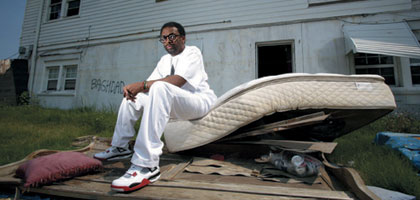
Wednesday 27 November, 4.00 pm
Room 106, University of Westminster, 106 Wells Street , London W1T 3UW
Christopher Lloyd, Goldsmiths, University of London
‘Looking at the “Southern Visual Legacy” in Spike Lee’s When the Levees Broke’
What are we to do with images of death that remind us of, and insist that we recall, other deathly cultural memories? What ethical obligations do we have to see death in larger ocular frameworks? These broad questions frame my analysis, which looks at a selection of photographs shown in Spike Lee’s documentary When the Levees Broke. Charting Hurricane Katrina and her aftermath, the film reveals the biopolitical life (and death) of Southerners in New Orleans and the Gulf region. More specifically, African-American life is revealed by Lee to be precariously entwined in the region’s historical and cultural contours. The images of African-American death that we see in the documentary, I argue, trigger visual memories of other pictures of corporeal trauma from the region’s past. If, as Katherine Henninger argues, ‘photographers and photographs in the South constitute a vast visual legacy: a complex series of continuities and ruptures that help shape southern identity itself’, then we must attend to such connections across Southern visual culture. My paper aims to contribute to this process, illuminating some of the memorative links between the photographs of dead black New Orleanians in When the Levees Broke with, particularly, lynching photographs and the image of Emmett Till in his coffin. In making explicit the ‘Southern visual legacy’ of Lee’s film, we might not only contribute insight into the debates on Southern identity and regionalism in the twenty-first century, but also signal ways of reading images of African-Americans through broader historical and cultural frames.
Important: Historical Novel symposium change of venue, Dec 3rd

Because of the projected national university strike on December 3rd, the Historical Novel of the Contemporary Symposium scheduled for that afternoon will now be run as an independent event to be held in the downstairs space at the Carroll / Fletcher Gallery in central London. We are extremely grateful to Carroll / Fletcher for the generous offer to host.
Revised details as follows:
The Historical Novel of the Contemporary: A Symposium
Tuesday 3rd December, 2-6pm
Carroll / Fletcher Gallery, 56 – 57 Eastcastle Street, London W1W 8EQ
Speakers: Emmanuel Bouju (Rennes), David Cunningham (Westminster), John Kraniauskas (Birkbeck), Fiona Price (Chichester), Leigh Wilson (Westminster)
The subject of a revival in recent decades, in both its ‘literary’ and ‘popular’ forms, for Georg Lukács the historical novel was, above all, that which narrated the ‘pre-history of the present’. Discussing authors ranging from Roberto Bolano to David Peace, Hilary Mantel to Wu Ming, this afternoon symposium considers the historiographic and political forms of the historical novel today as it might narrate the pre-history of our own contemporary.
Tagged as London, novel, radical philosophy
Medics, Monsters and Mash-ups seminar, Nov 20th

Centre for the Study of Science and Imagination (SCIMAG) Seminar
Wednesday November 20, 3.30-5pm, Room 219 Wells Street
Medics, Monsters and Mash-ups: Gothic 2.0
Anthony Mandal (Cardiff University)
“Humanity 2.0 is an understanding of the human condition that no longer takes the ‘normal human body’ as given. On the one hand, we’re learning more about our continuity with the rest of nature—in terms of the ecology, genetic make-up, evolutionary history. On this basis, it’s easy to conclude that being ‘human’ is overrated. But on the other hand, we’re also learning more about how to enhance the capacities that have traditionally marked us off from the rest of nature.” — Steve Fuller, Auguste Comte Chair in Social Epistemology, Warwick.
At the end of November 2012, Anthony Mandal won a commission through the AHRC’s REACT Books & Print initiative. Since January 2013, he has been working as lead academic partner with Bristol-based creative company, SlingShot, on Jekyll 2.0: Embodying the Gothic Text, to create a pervasive media experience that draws on the narrative and themes of Robert Louis Stevenson’s gothic masterpiece, Jekyll and Hyde (1886). The core of the project addresses the fundamental questions of Jekyll and Hyde: What makes us human? Do our minds control our bodies or are we shaped by our urges, compulsions and appetites? Will technology radically transform us into a new organism, ‘Humanity 2.0’? Such questions are nothing new: during the 19th century, the cultural implications of emerging theories of identity and the dominance of science were explored by numerous works of literature. Drawing on the gothic tradition, the project transforms reading into play, using participants’ bio-data (breathing, heart-rate, galvanic skin response) to shape their experience in uncanny ways.
Jekyll 2.0 will be a location-based pervasive media adaptation of Stevenson’s novel, reclaiming its transgressive power and reframing its central themes for the age of the bio-hacker. Neither a game nor a story, Jekyll 2.0 adapts a classic literary book using 21st-century technology to explore whether ‘humanity’ is a stable and meaningful concept or simply a convenient construction. As such, it merges linear fictional ‘narrative’, the interactivity associated with street gaming and the technological uncanny of bio-sensory feedback. Anthony’s talk will offer an overview of how the project is merging contemporary bio-technology with classic gothic preoccupations in order to create an immanent experience intended to be both entertaining and thought-provoking. The talk will also reflect on the methodological and conceptual questions that are emerging from current debates on creativity and technology in the early twenty-first century.
Dr Anthony Mandal (mandal@cardiff.ac.uk) is Reader in English Literature at Cardiff University where he is also Director of the Centre for Editorial & Intertextual Research.
Translating China

An excellent article up on the AHRC website about Anne Witchard’s China in Britain project, which is supported by the AHRC under the theme of ‘Translating Cultures’. The project looks at wider notions of China being ‘translated,’ examining the role that stereotypes have played in shaping perceptions of China and Chinese people in the West, and how they continue to do so.
Read it here: http://www.ahrc.ac.uk/News-and-Events/Features/Pages/Reading-China.aspx
Expanded Territories seminar, Dec 5th
Thursday 5 December, 12.30 – 14.00
Room M324, 35 Marylebone Road, London NW1 5LS
Measurement as Argument:
Planetary Constructions, PostNatural Histories, and the Will to Knowledge
Seth Denizen, Anna-Sophie Springer, Etienne Turpin
Organized by Lindsay Bremner
In this Expanded Territories seminar, Denizen Springer and Turpin will consider the relationship among the construction of systems of thought, our knowledge of the Earth System, and what Michel Foucault, following Nietzsche, describes as the will to knowledge. By examining several key episodes in the mid to late nineteenth century, including Antonio Stoppani’s argument for an “Anthropozoic” era, Vasily Dokuchaev’s proposal for a soil science distinct from geology, Franz Wilhelm Junghuhn’s early cartography of Java, and Alfred Russel Wallace’s theory of biogeographical distribution, they observe how measurement as argument has advanced our understanding of the Earth system in its manifold complexity. Because these systems of thought are not given, but produced, they suggest “what real struggles and relations of domination are involved in the will to knowledge.” As the Anthropocene as an object of knowledge is being constructed by stratigraphers and geologists, a series of affinities connecting measurement, aesthetic practices and the production of evidence can be discerned. How measurement as argument will challenge our inherited views of the architectural object in the Anthropocene remains to be seen; what is evident already is that this will to knowledge frames both our perception of the world and our capacity to change it.
Seth Denizen is a designer and researcher who currently teaches in the Division of Landscape Architecture at Hong Kong University. Anna-Sophie Springer is a writer, curator, and editor and co-director of the independent press K. Verlag in Berlin, Germany. Etienne Turpin is the founder and director of anexact office in Jakarta, Indonesia, and author of Architecture in the Anthropocene, Encounters among Design, Deep Time, Science and Philosophy.
Tagged as Architecture, ecology, science, Theory, Urban
Call for Papers: The Mediated City, LA, Oct 2014

The Mediated City, Part Two – Los Angeles
Woodbury University, Los Angeles , October 1-3 2014
Keynote Presentation: Kenneth Frampton
Taking as its starting point the 50 year anniversary of Marshall McLuhan’s Understanding Media and the idea of “the global village”, the conference aims to bring people from diverse backgrounds together around the issue of the modern city.
Deadline for abstracts February 15th; Deadline for full papers / detailed proposals June 15th
Visit: http://architecturemps.com/los-angeles/
Tagged as Architecture, technology, Urban
Luhmann Observed book launch, Nov 22nd

Friday, 22 November, 5-7pm
Room 3.15, University of Westminster, 309 Regent Street, London W1B 2HW
A quick plug for the book launch and reception for an exciting new book, Luhmann Observed: Radical Theoretical Encounters, edited by our colleague Andreas Philippopoulos-Mihalopoulos along with Anders La Cour. With speeches by Hans-Georg Moeller (University College Cork) and Sven Opitz (Hamburg).
RSVP to: victoria.brooks@my.westminster.ac.uk
Tagged as ecology, law, radical philosophy, Theory
IMCC Announces Appointment of New Director, Professor John Beck
After five glorious years directing the IMCC, Marq Smith is moving on to pastures new, taking up a new post as Head of Research and Doctoral Studies in the School of Humanities at the Royal College of Art. We wish him all the best. We are delighted, however, to announce the appointment of Professor John Beck as the Institute’s second Director, inaugurating a new era in the IMCC’s history.
In his own research, John works in American literature and culture, photographic theory and visual culture. He is on the editorial board of the journal Cultural Politics, and his most recent book, Dirty Wars: Landscape, Power, and Waste in Western American Literature, was winner of the Western Literature Association’s Thomas J. Lyon Prize in 2010. His current project is focused on the politics of American landscape representation.
Watch this space…
The Polytechnic Touring Association seminar, Nov 13

Wednesday 13th November, 5.30pm
Room 106, University of Westminster, 32-38 Wells Street, London W1T 3UW
Sara Dominici, University of Westminster
“The Polytechnic Touring Association: from culture as education to culture as leisure (1888-1939)”
This paper looks at how the idea of culture promoted by the Polytechnic Touring Association (PTA) changed in the period from 1888, the year subsequently celebrated as the origin of the PTA, and the end of the interwar period. During this timeframe the organisation of the tours shifted from endorsing the Polytechnic’s philanthropic approach, to responding to a commercial context. In 1911 the travel firm had become a separate business. This influenced the PTA’s approach to the tourists, which from individuals to instruct became customers to please and, in turn, the understanding of what would make cultural travel an improving experience. The early excursions were described as ‘educational holiday tours’, thus emphasising travel as an organised form of learning; by the 1930s, these were promoted as ‘holidays to the loveliest places in Europe’, suggesting instead a more ‘relaxed’ approach to the encounter with cultural sites. This paper discusses this passage by considering how the transformation of culture into a product of consumption influenced its commercialisation. Specifically, it evaluates what was understood to be ‘educational’ in the experience of travel offered by the PTA, as the organisation transitioned from providing a learning experience to a service.
Sara is a PhD student affiliated to the IMCC, currently completing her doctoral thesis on the PTA.
Tagged as education, photography, visual culture
We’re back … with apologies

Apologies from all those at the Institute for the interruption to our service. The website has been down for a few days, but we’re very happy to be back!
Overwhelming China on Radio 4
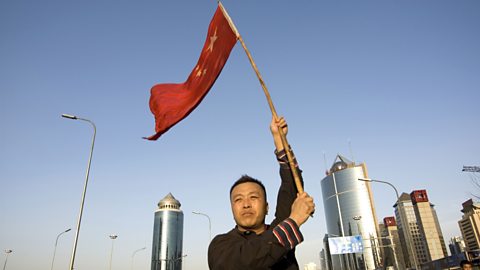
Our own Anne Witchard appears on the recent BBC4 documentary, ‘Overwhelming China’, which traces current anxieties about global economic takeover back through the political sinophobia of the Cold War period to earlier, pulp fantasies of Yellow Peril, Limehouse Chinatown and the ‘discovery’ of the enemy within.
You can listen at: http://www.bbc.co.uk/programmes/b03ffskf
Queer London Research Forum Launch, Nov 29th

Queer London Research Forum Launch Event
Old Cinema, University of Westminster, 309 Regent Street, London
We very much hope that you will be interested in attending. Places must be reserved. This can be done by emailing queerlondonresearchforum@gmail.com
The View from Dover talk, Nov 12
David Herd, ‘The View from Dover’ Tuesday 12 November 2013, 7pm
The Old Cinema, University of Westminster, 309 Regent Street
‘The View from Dover’ is the first of a series of talks and essays by David Herd that take their bearings from the site of The Citadel on Dover’s Western Heights. Originally constructed at the time of the Napoleonic Wars, as part of a network of fortifications, The Citadel knew various functions before its present use as an immigration removal centre. Starting at the building itself, with its iconic location, this talk asks what it means to view contemporary culture from such a contested site. Focusing questions of movement and belonging, Dover’s Citadel offers one of the most striking views in modern Britain. What becomes visible, the talk will ask, from a site held legally and linguistically just outside?
David Herd is Professor of Modern Literature at the University of Kent, where he is director of the Centre for Modern Poetry. He is the author of Outwith (Bookthug 2012), All Just (Carcanet 2012), Enthusiast! Essays on Modern American Literature (Manchester 2007), and John Ashbery and American Poetry (Manchester 2001).
For further information please contact either Georgina Colby g.colby@westminster or John Beck j.beck@westminster.ac.uk.
The algorithmic heist and narrative control seminar, Oct 30th

Criminal Programming: The algorithmic heist and narrative control
Hallvard Haug, Birkbeck, University of London
Wednesday 30 October, 4pm
Room 106, University of Westminster, Wells Street
Black Gold film showing tonight
Black Gold film showing
Room LA103, University of Westminster, Marylebone, Tues 22 October, 6pm
If you’ve never given much thought to the lives affected each time you choose one brand of coffee over another, allow this handsomely mounted documentary from British filmmakers Marc and Nick Francis to serve as a bracing, double-shot of reality. Focusing exclusively on the coffee-producing regions of Ethiopia — the so-called “birthplace of coffee” — the Francis brothers explore the long and unnecessarily convoluted chain that brings the area’s highly prized coffee beans to the shelves of your supermarket, specialty store or Starbucks. The market prices for coffee are set by buyers and sellers in the financial capitals of New York and London, far from the growers who are most often unaware of the market rate, and at the time of filming, farmers’ profits dropped to a 30-year low: One kilo of beans, which can brew up to 80 cups of $3-a-shot coffee nets the grower less than 23 cents. And yet over the last 15 years, retail sales of coffee have nearly tripled to $80 billion a year with four multinational corporations — Kraft, Nestle, Procter & Gamble and Sara Lee — dominating the market.
Followed by Q&A with the directors.
Staging Science events, Dec 6 and 7 2013

Hosted by our colleagues in the new Centre for the Study of Science and Imagination, a series of exciting events on Staging Science in December:
Staging Historical and Contemporary Science: A Roundtable
Friday December 6, 2013, 6.30-8.00pm (drinks from 6pm)
The Boardroom, University of Westminster, 309 Regent Street
Jim Al-Khalili (Physicist, Science Communicator and Broadcaster)
Tim Boon (Head of Research, Science Museum)
Imran Khan (Chief Executive, British Science Association)
Katrina Nilsson (Head of Contemporary Science, Science Museum)
Jonathan Renouf (Executive Producer, BBC Science Unit)
Staging Science ColloquiumSaturday December 7, 2013, 9.00-6.00pm
The Boardroom, University of Westminster, 309 Regent Street
Speakers include: Iwan Morus (Aberystwyth), Daniel Brown (Southampton), Robert Kargon (Johns Hopkins), Jeremy Brooker (Independent Researcher), Tiffany Watt-Smith (Queen Mary), Kirsten Shepherd-Barr (Oxford), Jean-Baptiste Gouyon (Science Museum, London), Bernard Lightman (York, Canada), Martin Willis (Westminster)
6.00-7.00pm: Drinks Reception and Book Launch for Jeremy Brooker’s Temple of Minerva (Regent Street Building Foyer)
followed by
A Performance of the Pepper’s Ghost Illusion with Charles Dickens’s ‘The Haunted Man’
Produced, directed and performed by Richard Hand and Geraint D’Arcy (University of South Wales)
There will be 2 performances of the Pepper’s Ghost Illusion – 7.00-7.30 and 7.45-8.15 (The Old Cinema)
Places for all the events that make up Staging Science are limited. Please apply early for each event as below. In your email please make clear which event or events you wish to attend. Many thanks.
To reserve a place at the Roundtable (Friday evening) please contact Rebecca Spear on rebecca.spear@my.westminster.ac.uk
To reserve a place at the colloquium (Saturday day), which comes with an invitation to the Pepper’s Ghost performance (Saturday evening), please contact Rebecca Spear on rebecca.spear@my.westminster.ac.uk.
Please do advise Rebecca if you wish to come to the colloquium but are not able to attend the evening Performance.
To inquire about a place at the Pepper’s Ghost performance only please contact Professor Martin Willis on m.willis@westminster.ac.uk
For updates on Staging Science connect to SCIMAG’s blog site at: http://scienceimagination.wordpress.com
Tagged as cinema, London, museums, science, visual culture
Reading group at Carroll / Fletcher: Hard Road to Renewal, Nov 12th

A quick plug for our friends and neighbours at the Carroll/Fletcher Gallery:
Reading Group | Chapter 5: The Hard Road to Renewal with Peter Osborne
Tuesday 12 November, 7:00-9:00pm
Carroll / Fletcher, 56-57 Eastcastle Street, London W1W 8EQ
Tickets £5.00, refreshments included
“There is no alternative to making anew the ‘revolution of our times’ or sinking slowly into historical irrelevance. I believe, with Gramsci, that we must first attend ‘violently’ to things as they are, without illusions or false hopes, if we are to transcend the present. … And from that starting point, begin to construct a possible alternative scenario, an alternative conception of ‘modernity’, an alternative future.”
Stuart Hall, The Hard Road to Renewal, 1988
Chapter 5, led by Professor Peter Osborne, will take as its starting point the introduction and conclusion of Stuart Hall’s 1988 collection of essays The Hard Road to Renewal: Thatcherism and the Crisis of the Left. In the twenty-five years since the publication of The Hard Road to Renewal, a period that included thirteen continuous years of Labour government, how has the Left in Britain (both the Labour party and the non-Labour left) responded to Thatcherism’s ‘authoritarian populism’ and ‘the decisive break with the post-war consensus, the profound reshaping of social life which it has set in motion’? And does Hall’s analysis of Thatcherism as a ‘hegemonic conception of politics as a war of position’, and his adoption of a ‘discursive conception of ideology’ and, after Ralph Milliband, of a notion of ‘an accelerated process of recomposition’ of class, provide the basis for an ‘alternative conception of modernity, an alternative future’?
Reading material: Please click here to download.
Book here: www.carrollfletcher.eventbrite.com

